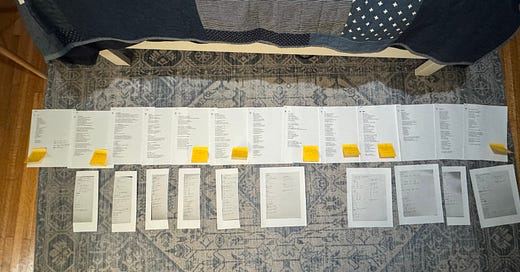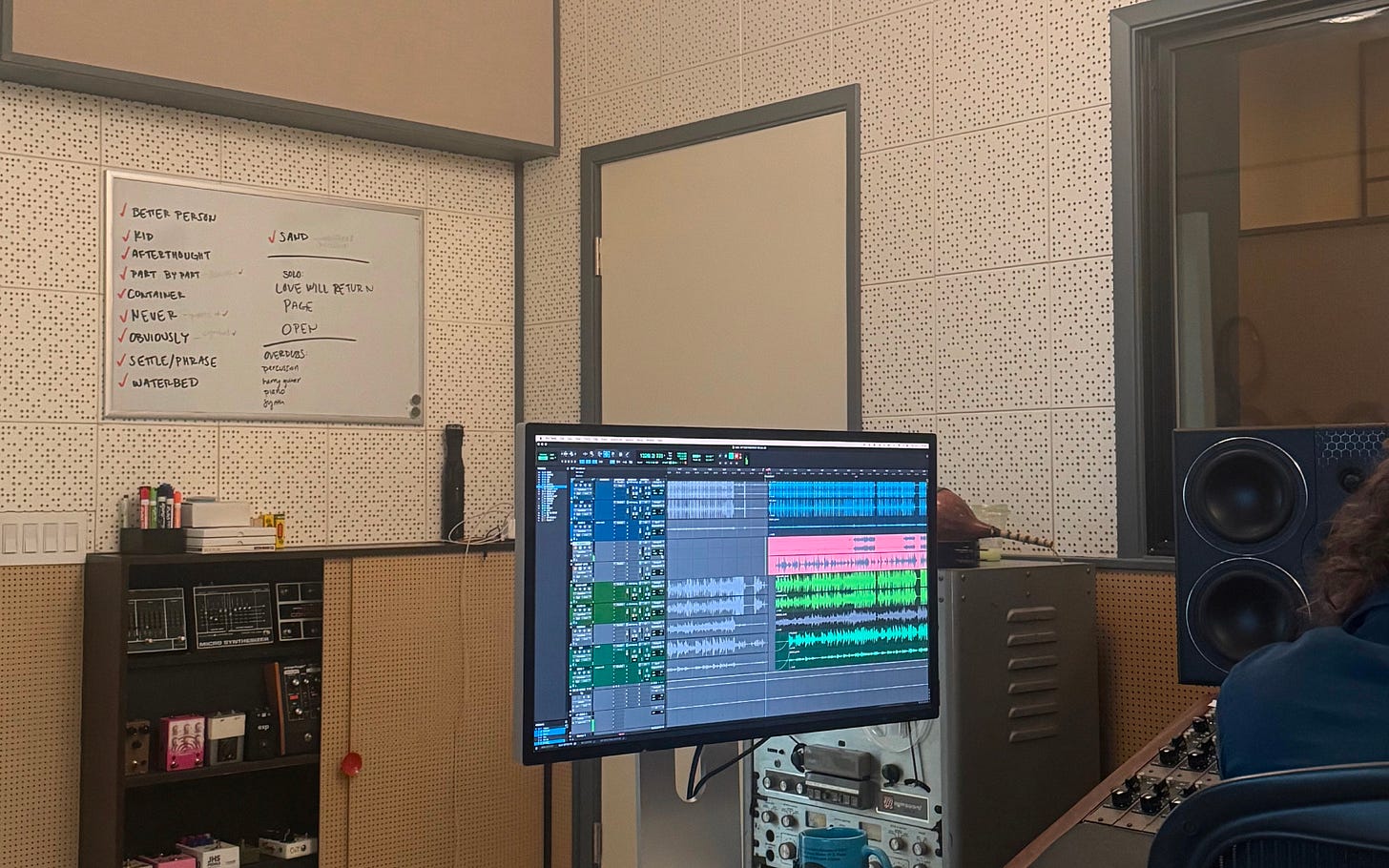Hometown Hero #15: On Ambiguous Loss
At the beginning of June, I flew to LA to make a record and came back to New York with about 60-70% of it done. The plan was to finish tracking it, but I’ve written previously about the adjustment of expectations and I’m learning to take my own advice. During the first two days of the sessions, we recorded 12 songs live. As detailed in the last newsletter, recording live and relatively quickly is a completely antithetical process to how I made Imposing on a Hometown, and I’m learning to lean into the aliveness, the chance of it all. Ultimately, what we got has a certain energy (for lack of a better word) to it because we were all in the room, no click track, co-creating a thing that hadn’t existed before we began building it together.
I think I’m going to call the record Ambiguous Loss, or something with a similar sentiment. Titles are just as much meaning as they are sound, and I’m still playing with the sonic sensation of saying it, not totally sold yet.
Coined by therapist Pauline Boss in the 70s, “ambiguous loss,” as I understand it, is grief for someone or something that is not really gone. I’ve heard it used mostly referring to break-ups, especially when the person is still in your life, fully or peripherally.
Boss writes:
Ambiguous loss defies resolution, creates long-term confusion about who is in or out of a particular couple or family, and freezes the process of grieving. With death, there is official certification of loss, proof of the transformation from life to death, and support for mourners through community rituals and gatherings. With ambiguous loss, none of these markers exist. The persisting ambiguity blocks cognition, coping, meaning-making, and freezes the grief process.
I’m not sure where I first heard the term “ambiguous loss,” but I’ve had it written down at the top of my to-do list for years, a reminder to save it for later use. Underneath that is “relentless exteriority,” a concept I heard Eliza Berry Callahan speak on at Zwirner when her book The Hearing Test came out. Perhaps something I’ll save for the third album.
Over the last few months, as I put together a list of songs for the record, I came to a surprising realization in the process of sequencing. Although the songs themselves have at least four different subjects, written over the span of three years, when put in a specific order they present themselves as one singular narrative. Two love songs appearing synonymous. A grief song a continuation of the one before it. The subject resultantly ambiguous.
What does it mean that the songs in sequence sound as though I am addressing a single subject? The MFA student in me immediately jumps to the parallels between linguistic and emotional patterns. In simpler terms: I keep finding myself in the same situations, so, naturally, these songs fit together. I also wonder if along the way, without being conscious of it, I knew I was writing a single project, even when two heartbreaks felt entirely distinct from one another.
I won’t know what it all means until it’s done and there’s a title on it and accompanying visuals. I didn’t know how much the clown would be the central figure of IOAH until I took a step back at the end of the process. And I’m learning how to feel more comfortable in that unknown space, to let these things emerge from the work itself.
I wonder if the nature of “ambiguous loss” extends past the grief for a single person. I am attracted to the word choice of “ambiguous,” the notion that not only is the grief itself ambiguous because the person remains alive, but that the subject itself flickers, evading definition. Often the act of missing someone from a recent episode (i.e. your latest breakup) unlocks a deeper wound, grief for someone or something farther away from the present, yet just as unresolved. I’m interested in the multiplicity of “ambiguous” as a modifier, challenging the notion that grief always equates death. It asks: how do we synthesize grief without finality?
I have something akin to ambiguous loss for places I’ve lived that still stand with new tenants and unfamiliar furniture. Ambiguous loss for friends and friend groups and larger social situations which we outgrew or moved geographically away from. Ambiguous loss for breakups and even for people that I was never with. In a single term, I find an umbrella (not that any term can be all-encompassing of a given situation) for what has felt like an unspeakable feeling. And that gets me a little closer not towards resolution (I don’t think fully resolving ambiguous loss is possible), but to showing up in the present tense.
Some odds and ends:
I am playing bass on tour with the band Lampland July 11-18. Come say hi, East Coast friends. Shows here.
I am playing the Calgary Folk Festival with Katy Kirby, July 25-27.
The next SW show is 9/29 at The Broadway opening for Kath Bloom. Tickets soon.
As for today’s writing prompt:
What’s the first thing that comes to mind when you hear the term “ambiguous loss”? What have you lost not to a death or ceasing, but to a growing out of, moving away from, a slow fading? Take just even three minutes of free writing to meditate on the topic.





